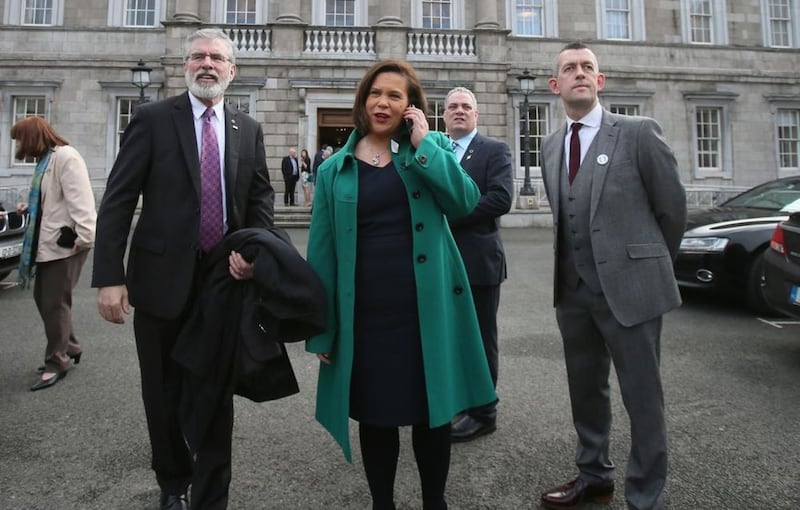As shock subsides over Sir Jeffrey Donaldson’s resignation, it seems the political ramifications may have been over-stated. The DUP is determined to put on a united front, at least until the general election, and there is no prospect of it walking out of Stormont. New leader Gavin Robinson will not be attempting any drastic changes of policy. He may even find it easier to spin the ‘Donaldson deal’, as the TUV denounces it, by toning down his predecessor’s more exaggerated claims.
So what might cause instability? The clearest danger ahead is Robinson losing his East Belfast seat, the DUP’s most marginal, requiring a new leader. If the party tries getting around this through co-option to Stormont or some other game of musical chairs, internal divides could rupture.
However, East Belfast was already at risk and losing it would always have been a bombshell. By the time of the election, the effect of Donaldson’s departure on this could be difficult to discern.
The DUP is determined to put on a united front, at least until the general election, and there is no prospect of it walking out of Stormont
**
The PSNI issued a press release on Easter Monday correcting “commentary” around the arrest of Sir Jeffrey Donaldson. Officers received an initial complaint in “early March”, it said, contrary to reports and rumours of an investigation beginning in January.
This statement debunked political conspiracy theories about the arrest. While that has to be welcomed, it is unclear how it is the responsibility of the PSNI press office.
The statement would have been less odd as a response to a media question. But any journalist thinking of asking the question would have expected to be told the PSNI could not comment on the case.

**
The Northern Ireland Office has been criticised for releasing historical files to the National Archives in London instead of the Public Records Office in Belfast, where researchers would expect to find them. When the Belfast Telegraph discovered this it sent staff to London to investigate, a deterrent expense for the regional press.
This is an important public interest story and the findings being published raise uncomfortable questions for everyone, yet it seems to be mainly republicans raging at the Belfast Telegraph for suggesting Sinn Féin’s political project had tacit official encouragement. This ought to be of far greater concern to unionists.
**
Richard Pengelly, a senior civil servant and husband of the deputy first minister, has been drafted into the troubled Education Authority as interim chief executive by DUP minister Paul Givan.
This unusual move has caused some contention and it has emerged the authority’s board was badly split on it, with nine votes for and six against.

Their concerns may have been valid but it does raise the question of whether the board could have done more to prevent or at least highlight the dysfunction Pengelly has been parachuted in to solve. By law, the 20-person board must comprise eight party political nominees by assembly strength, four representatives of CCMS, four representatives of the Protestant Church governors and one representative each of the integrated, Irish, controlled grammar and voluntary grammar sectors.
This structure seems designed to preserve the inefficiencies the Education Authority was supposedly set up a decade ago to address.
**
After last month’s failed constitutional referendums in the Republic, Sinn Féin performed a u-turn on its support for hate crime legislation.
This has been followed by the farcical collapse of hate crime legislation in Scotland, due in part to being ridiculed by author JK Rowling.

So where now for the hate crime bill planned for Northern Ireland?
Alliance justice minister Naomi Long commissioned a judge-led consultation on legislation in 2019, it was completed a year later and her department put recommendations out to public consultation in early 2022, but then Stormont collapsed and progress ground to a halt.
The report and recommendations drew heavily on Scotland’s plans, with a new definition of sectarian hate crime the most significant difference. They also contained ideas that have proved controversial in the Republic.
Getting this past the DUP always looked tricky. If Sinn Féin has second thoughts, the legislation looks doomed.
**
The biggest-ever expansion of free childcare for working parents has begun in England. Two-year-olds will get 15 hours per week as of this week. By next September, it will be 30 hours per week between the end of maternity leave and the start of school.
Stormont’s budget has already been given an equivalent increase in funding under the Barnett formula. With devolution only just restored, it is a little early to blame the executive for the lack of a similar scheme here. But that excuse will only hold for so long. Ultimately, if we do not get free childcare, it will be solely because Stormont wants to spend the money on something else.
**
Belfast’s Glider is having its praises sung in Liverpool. Steve Rotheram, executive mayor of the Liverpool city region, is campaigning for re-election by promising “a trackless tram network, similar to the Belfast Glider”.

Although Liverpool has a decent commuter rail network it has gaps that will never be economic to fill, in particular to the airport and Anfield stadium.
Rotheram claims a Glider would be ideal for these routes and wider suburban expansion. His campaign has led to a flurry of English media interest in Belfast’s ‘trackless tram’, most of it positive, although anyone who thinks one bendy-bus every 10 minutes could serve a 60,000-seat stadium must never have seen Titanic Quarter at evening rush-hour.
**

Ireland’s first directly-elected executive mayor will be chosen in June by the voters of Limerick. It was the only one of three cities, the others being Cork and Waterford, that opted to create such a post in plebiscites in 2019.
Sinn Féin’s Limerick TD, Maurice Quinlivan, has announced he will seek his party’s nomination, despite having criticised the new office for its limited powers.
He has pointed out Sinn Féin policy is to devolve more powers to the elected mayor and he would expect a Sinn Féin government to go further, leading to something closer to the post occupied by Steve Rotheram.
Devolved city regions might be a better model of ‘constitutional change’ than some other ideas floating around.







